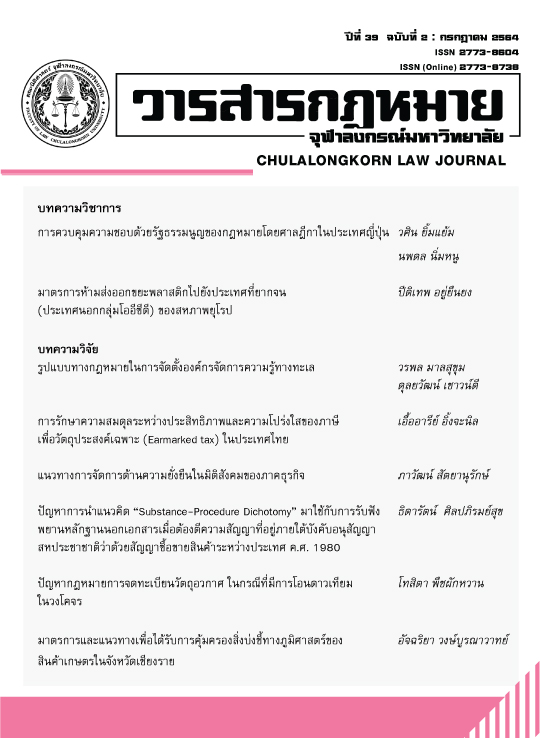การควบคุมความชอบด้วยรัฐธรรมนูญของกฎหมายโดยศาลฎีกาในประเทศญี่ปุ่น
Main Article Content
บทคัดย่อ
รัฐธรรมนูญของประเทศญี่ปุ่นจัดระเบียบโครงสร้างองค์กรทางการเมืองอิงหลักการแบ่งแยกอำนาจ
โดยกำหนดให้รัฐสภาใช้อำนาจนิติบัญญัติ คณะรัฐมนตรีใช้อำนาจบริหาร และศาลใช้อำนาจทางตุลาการ และ
ยอมรับหลักความเป็นกฎหมายสูงสุดของรัฐธรรมนูญ พร้อมมอบอำนาจในการคุ้มครองหลักความเป็นกฎหมาย
สูงสุดของรัฐธรรมนูญให้แก่ศาลฎีกา กล่าวคือ ศาลฎีกาเป็นองค์กรที่มีอำนาจควบคุมความชอบด้วยรัฐธรรมนูญ
ของกฎหมายหรือการกระทำอื่น ๆผ่านกระบวนการพิจารณาพิพากษาตามกฎหมายวิธิพิจารณาความ อย่างไร
ก็ตาม ในทางปฏิบัติปรากฏว่า ด้วยเหตุผลในทางการเมือง ศาลฎีกาจึงมักหลีกเลี่ยงการใช้อำนาจตรวจสอบ
ความชอบด้วยรัฐธรรมนูญ เนื่องจากการยื่นคำร้องต่อศาลฎีกาให้ตรวจสอบความชอบด้วยรัฐธรรมนูญของ
กฎหมายมักเป็นการกระทำที่หวังผลในทางการเมืองมากกว่าหวังผลทางกฎหมายจากคำพิพากษาศาล จึงทำให้
ศาลฎีกาหลีกเลี่ยงการวินิจฉัยว่ากฎหมายของรัฐสภาขัดหรือแย้งต่อรัฐธรรมนูญ
Article Details
ลิขสิทธิ์และเนื้อหาในเว็บไซต์ของวารสารกฎหมาย (รวมถึง โดยไม่จำกัดเฉพาะ เนื้อหา รหัสคอมพิวเตอร์ งานศิลป์ ภาพถ่าย รูปภาพ ดนตรีกรรม โสตทัศนวัสดุ) เป็นกรรมสิทธิ์ของวารสารกฎหมาย และผู้ได้รับการโอนสิทธิทุกราย
1. วารสารกฎหมาย ให้อนุญาตให้คุณใช้สิทธิอันไม่เฉพาะเจาะจงที่สามารถถูกถอนเมื่อใดก็ได้ โดยไม่มีค่าใช้จ่าย ในการ
- เยี่ยมชมเว็บไซต์และเอกสารในเว็บไซต์นี้ จากคอมพิวเตอร์หรือเครื่องมือสื่อสารผ่านเว็บบราวเซอร์
- คัดลอกและจัดเก็บเว็บไซต์และเอกสารในเว็บไซต์นี้บนลงคอมพิวเตอร์ของคุณผ่านระบบความจำ cache
- สั่งพิมพ์เอกสารจากเว็บไซต์นี้สำหรับการใช้ส่วนตัวของคุณ
- ผลงานที่ได้รับการตีพิมพ์โดยวารสารกฎหมาย จุฬาลงกรณ์มหาวิทยาลัย ถูกคุ้มครองภายใต้ Creative Commons Attribution 4.0 International License ซึ่งอนุญาตให้ทุกคนสามารถคัดลอก แจกจ่าย ดัดแปลง ส่งต่อ ผลงานได้ ก็ต่อเมื่อผลงานและแหล่งข้อมูลได้รับการอ้างอิงอย่างเหมาะสม
2. วารสารกฎหมาย จุฬาลงกรณ์มหาวิทยาลัย สงวนสิทธิ์ไม่อนุญาตให้คุณใช้สิทธิอื่นใดที่เกี่ยวข้องกับเว็บไซต์และเอกสารบนเว็บไซต์นี้ เช่น การคัดลอก ดัดแปลง เปลี่ยนแปลง ส่งต่อ ตีพิมพ์ แจกจ่าย เผยแพร่ จัดแสดงในที่สาธารณะ ไม่ว่าจะในรูปแบบใดก็ตาม ซึ่งเว็บไซต์หรือเอกสารบนเว็บไซต์ โดยไม่อ้างอิงถึงแหล่งข้อมูลหรือโดยไม่ได้รับอนุญาตเป็นลายลักษณ์อักษรจากวารสารกฎหมาย จุฬาลงกรณ์มหาวิทยาลัย
3. คุณอาจขออนุญาตที่จะใช้เอกสารอันมีลิขสิทธิ์บนเว็บไซต์นี้โดยการเขียนอีเมลล์มายัง journal@law.chula.ac.th
4. วารสารกฎหมาย จุฬาลงกรณ์มหาวิทยาลัย เข้มงวดกับการคุ้มครองลิขสิทธิ์อย่างมาก หากวารสารกฎหมาย จุฬาลงกรณ์มหาวิทยาลัยพบว่าคุณได้ใช้เอกสารอันมีลิขสิทธิ์บนเว็บไซต์นี้โดยไม่ถูกต้องตามการอนุญาตให้ใช้สิทธิ ดังที่กล่าวไปข้างต้น วารสารกฎหมาย จุฬาลงกรณ์มหาวิทยาลัยอาจดำเนินคดีตามกฎหมายต่อคุณได้ เพื่อเรียกร้องค่าเสียหายที่เป็นตัวเงินและคำขอชั่วคราวให้คุณหยุดการใช้เอกสารดังกล่าว ทั้งนี้ คุณอาจถูกสั่งให้ชดใช้ค่าใช้จ่ายใดๆ ที่เกี่ยวข้องกับการดำเนินการตามกฎหมายนี้
หากคุณพบเห็นการใช้เอกสารอันมีลิขสิทธิ์ของวารสารกฎหมาย จุฬาลงกรณ์มหาวิทยาลัย ที่ขัดหรืออาจขัดต่อการอนุญาตให้ใช้สิทธิดังที่ได้กล่าวไปข้างต้น โดยเชื่อว่าได้ละเมิดลิขสิทธิ์ของคุณหรือของผู้อื่น สามารถร้องเรียนมาได้ที่ journal@law.chula.ac.th
เอกสารอ้างอิง
Hein, Patrick. How the Japanese became foreign to themselves: the impact of globalization on the private and public spheres in Japan. Vol. 164. LIT Verlag Münster, 2009.
Ito, Hirobumi. Commentaries on the Constitution of the Empire of Japan. Univ Publications of Amer, 1906.
Maki, John M. "The Constitution of Japan: pacifism, popular sovereignty, and fundamental human rights." Law and Contemporary Problems 53, no. 1 (1990): 73-87.
Satoh, Jun-ichi. "Judicial Review in Japan: An Overview of the Case Law and an Examination of Trends in the Japanese Supreme Court's Constitutional Oversight." Loy. LAL Rev. 41 (2007): 603.
Kawagishi, Norikazu. "The birth of judicial review in Japan." International journal of constitutional law 5, no. 2 (2007): 308-331.
Matsui, Shigenori. The constitution of Japan: a contextual analysis. Bloomsbury Publishing, 2010.
Matsui, Shigenori. "Why is the Japanese Supreme Court so conservative." Washington University Law Review 88 (2010): 1375-1424.
Ogawa, Ichiro. "Judicial review of administrative actions in Japan." Washington Law Review 43 (1967): 1075-1094.
Nishikawa, Toshiyuki. "The Future of the Japanese Constitution: From the" MacArthur Constitution" to What?." 比較法文化: 駿河台大学比較法研究所紀要 17 (2009): 51-79.
Hasebe, Yasua. "Constitutional borrowing and political theory." International Journal of Constitutional Law 1 (2003): 224.


